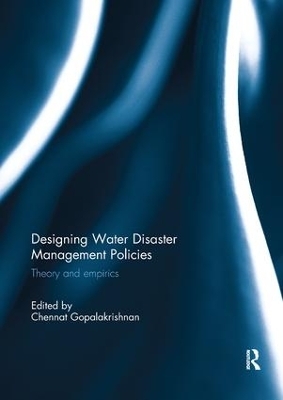
Designing Water Disaster Management Policies
Routledge (Verlag)
978-1-138-08539-8 (ISBN)
The specific topics studied in this book include a review and analysis of key policy areas and research priority areas associated with water disaster management, community participation in disaster risk reduction, the economics and politics of ‘green’ flood control, probabilistic flood forecasting for flood risk management, polycentric governance and flood risk management, drought management with the aid of dynamic inter-generational preferences, and how social resilience can inform SA/SIA for adaptive planning for climate change in vulnerable areas.
A unique feature of this book is its analysis of the causes and consequences of water disasters and efforts to address them successfully through policy-rich, cross-disciplinary and transnational papers. This book is designed to help enrich the sparse discourse on water disaster management policies and galvanize water professionals to craft creative solutions to tackle water disasters efficiently, equitably, and sustainably. This book should also be of considerable use to disaster management professionals, in general, and natural resource policy analysts.
This book was published as a special issue of the Journal of Natural Resource Policy Research.
Chennat Gopalakrishnan is Professor (Emeritus) of Natural Resource Economics at the University of Hawaii. He has published seven books and approximately 115 journal articles and technical papers on current and emerging issues in natural resource economics and policy. He is a fellow of the American Water Resources Association and International Water Resources Association and a Distinguished Scholar of the Western Agricultural Economics Association.
1. Introduction: designing water disaster management policies: theory and empirics 2. Flood disaster management policy: an analysis of the United States Community Ratings System 3. A historical examination of the Corps of Engineers and natural valley storage protection: the economics and politics of ‘green’ flood control 4. Probabilistic forecasting and the reshaping of flood risk management 5. Examining the benefits of collaboration: the Provider-User Matrix for collaborative flood risk management illustrated by the case of the Ljusnan River, Sweden 6. Adapting to catastrophic water scarcity in agriculture through social networking and inter-generational occupational transitioning 7. Can social resilience inform SA/SIA for adaptive planning for climate change in vulnerable regions?
| Erscheinungsdatum | 30.08.2017 |
|---|---|
| Verlagsort | London |
| Sprache | englisch |
| Maße | 174 x 246 mm |
| Gewicht | 204 g |
| Themenwelt | Naturwissenschaften ► Biologie ► Ökologie / Naturschutz |
| Naturwissenschaften ► Geowissenschaften ► Geografie / Kartografie | |
| Technik ► Umwelttechnik / Biotechnologie | |
| Wirtschaft ► Betriebswirtschaft / Management ► Unternehmensführung / Management | |
| ISBN-10 | 1-138-08539-1 / 1138085391 |
| ISBN-13 | 978-1-138-08539-8 / 9781138085398 |
| Zustand | Neuware |
| Haben Sie eine Frage zum Produkt? |
aus dem Bereich


